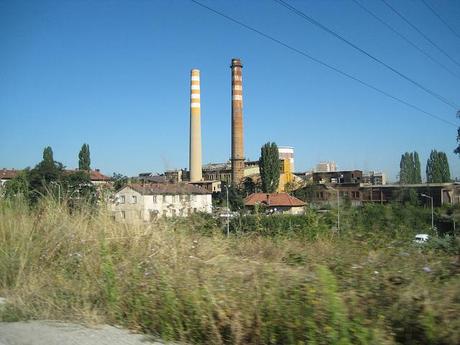
An abandoned former state-owned factory near Sofiya in the Bulgarian countryside, just one of many dotting the landscape as a legacy of inefficient state-owned enterprises. (Photo: Flickr user Gilgongo)
During the past decade, and especially since the financial crisis of 2008, governments have debated a variety of approaches to promoting economic growth, and State-Owned Enterprises (SOEs) have once again become a tool to focus resources on economic development.
For instance, in Russia we have witnessed the growth of “national champions” – state-owned firms that swept up private sector holdings in particular sectors (e.g. aerospace) in the hopes of jumpstarting competitive sectors, utilizing state resources and state-sponsored advantages. Despite the widespread privatizations throughout the nineties, we have also seen resurgent state interest in maintaining or regaining its ownership role in a variety of sectors including water and energy. Whether we like it or not, we must accept that in many emerging markets the state intends to continue participating in the economy as an owner, and views SOEs as a tool to direct development and provide services to all citizens.
This month the OECD released an excellent working paper working in economies where the state-owned sector plays a major role, “Competitive Neutrality and State Owned Enterprises: Challenges and Policy Options.”
This trend raises a few key questions regarding state-ownership: how does the state become a responsible owner and how do we guarantee accountability? How does the presence of state-owned enterprises directly or indirectly effect the competitive environment in a country? If state-owned enterprises squeeze out competition resulting efficiencies and growth, are they really serving the economic interests of their country?
At CIPE our partners around the world often complain that they are forced to compete in a “noncompetitive environment”, and when pressed they often identify state-owned competitors as the primary culprit.
The OECD has been active in addressing these issues through their Guidelines on Corporate Governance for State-Owned Enterprises, and more recently a new program on competitive neutrality of which the aforementioned paper is the first step of a multi-year effort.
The OECD recognizes and applauds that many state-owned firms are corporatizing and becoming more efficient, but point out that the advantages they gain by incumbency can crowd new market entrants out through SOE domination of markets and their ability to effect costs and pricing. These effects may be deliberate or unintended side-effects of the structure of the SOE activity, but in either case they must be recognized and addressed to allow for competition and growth.
The report also points out that tax breaks and other hidden subsidies also allow SOEs to gain unfair advantages over new market entrants, and may also encourage ongoing inefficiencies within the SOE.
The authors of the report have identify a number of policies that can be adopted by countries to help them address the potential impact of SOEs on competition, analyzing the legislative and administrative environment for SOEs and promoting greater transparency and accountability in determining their costs in private sector terms. Policy adjustments can then be made to level the playing field for the private sector. In cases where an uncompetitive environment is deliberately mandated, the authors concede that the only solution can be advocacy to reverse the policies.
By promoting improved corporate governance in SOEs and understanding their cost structures and politically-maintained advantages, policymakers can begin to create an environment in which SOEs are more accountable and private business can advocate for a fairer playing field.
By promoting the concept of Competitive Neutrality, the OECD seems to be asking governments and their state-owned firms to take the Hippocratic oath to “do no harm” when it comes to private sector growth. It will be interesting to watch how this debate unfolds in the coming years, the OECD’s paper is a terrific start to this debate, one in which I hope CIPE and partners will participate.



COMMENTS ( 1 )
posted on 07 June at 07:59
The State is not a good holder of economic values. First of all the only necessary area I will go into. Is the area that no matter what kind of regulations you place on them. If the state is allowed to control the economics of its people through SOE's which are naturally uncompetitive. As business use their connections as much as they can to make better deals. Thus then we see the free market dwindle. Which means that the balance of power from individuals to state power tribes is lost. Even worse we then see power tribes centralizing power around the SOE's so they can keep winning. Which is also based on natural forms of power acquisition's. The reason why the world did not properly transition. Was because of the Communist Chinese lying and hold back every way. In which instead of the free world concentrating more on the areas that needed the help. They all traded more with the Communists Chinese instead of the free markets. Now we see the remergence of the Communist Party like the Soviets, seeking to do such things, as create a single world currency, like the Soviets did, recreated the exclusive trading Bric, like the Soviets had the Bloc, and centralizing the worlds's resources, by setting up single fascist parties in foreign lands with resources, that control the SOE' and have no economic or political opposition so that the Communists Chinese can get the resources they need. In which is shown in the Venezuelan example. As Hugo sold the CCP oil for less than $5 a barrel, in which he then earned loans to force his people to get into a horrible long term oil contract with the CCP, and then completely invade US Private Oil sectors, all based on satellite Soviet style control. SOE's are the root of fascism.
Rider I Special Library Manager. http://rideriantieconomicwarfaretrisii.blogspot.com/